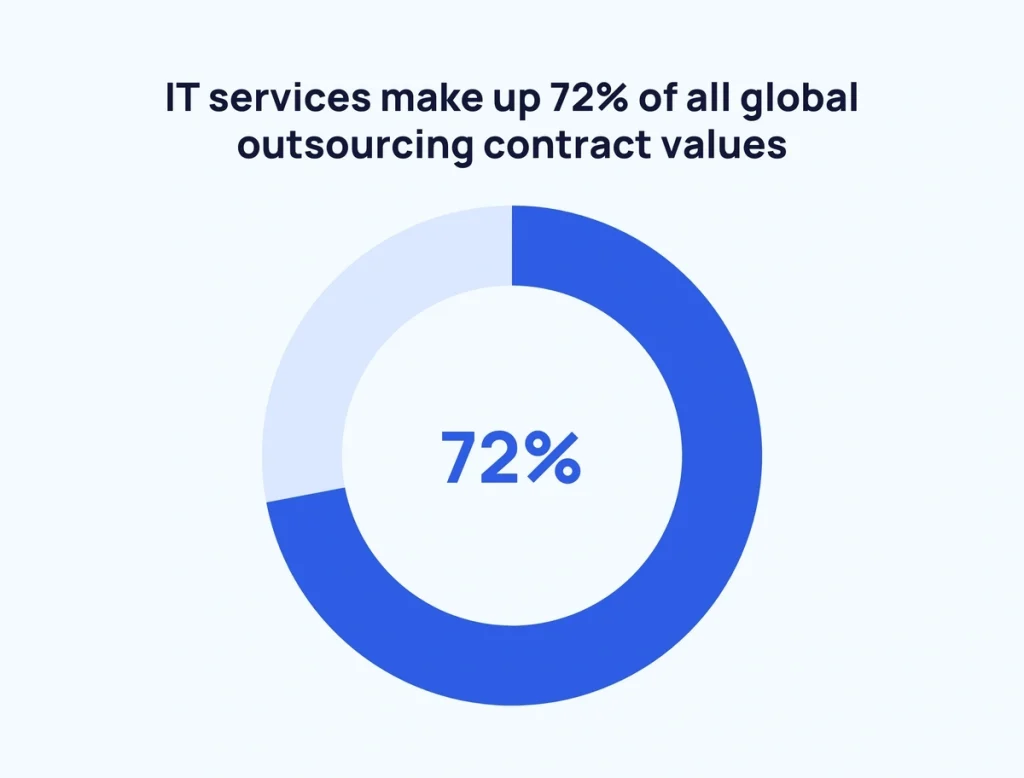Top 10 IT Outsourcing Trends in 2025

IT outsourcing is leveraging external services for IT-related business operations, application services, and digital solutions for businesses. According to Statista, revenue in the IT Outsourcing market is projected to reach $591.24 billion in 2025.
The goal of IT outsourcing is to maximize the productivity of a business or company through collaboration with third-party service providers.
Outsourcing includes software as a service (SaaS), cloud-based, and utility services. The right outsourcing partner will help you define your vision and strategies, get the most out of your contract, help decrease costs, speed up service delivery, and develop a good repertoire with your clients.

Image Source
In this blog post, I have listed the top 10 small business IT outsourcing trends in 2025 and beyond.
Let’s start!
What are the Most Outsourced IT Functions?
Since we’re in the digital age where gradually every business process might become automated, as of now, the following functions are outsourced mainly by IT businesses:
- Software development
- Web development
- Mobile application development
- Helpdesks
- Networks
- Human Resources (HR)
- Integrations
10 IT Outsourcing Trends
Now, let’s discuss some trends the top IT outsourcing companies consider to deliver reliable services:

1. Value over cost
One of the newest trends in the IT industry is outsourcing external services for value and not just for cost reduction. Businesses are more focused on hiring talent and expertise that offers the highest value to help them capture their desired market.
While reducing business expenses is necessary to maximize profit, it doesn’t have to be at the expense of getting low-value work. Moreover, many outsourcing clients acquire a better customer service experience for their clients by hiring external IT support rather than relying on in-house talent.
The crux is that modern IT businesses are not just outsourcing for cost reductions but effective technology management. So businesses want to go the extra mile to hire depending on which service provider offers the greatest value for improving their service.
2. Cloud-based Technology
Cloud-based technology is the backbone of every successful IT outsourcing company. If you didn’t have cloud-enabled storage, it would become challenging to collaborate with service providers sitting across the globe and exchanging media in real time.
Outsourcing companies usually offer three types of services to help you achieve your business goals:
Software as a Service (SaaS): Business process outsourcing (BPO) companies leverage customer relationship management (CRM) solutions like Salesforce and HubSpot to manage their client information.
Infrastructure as a Service (IaaS): Outsourcing involves managing and keeping data. Through IaaS solutions, BPO companies keep sensitive information like financial data and customer details safe on remote servers.
Platform as a Service (PaaS): BPO companies use PaaS solutions to offer their services. Outsourcing clients can subscribe to services on these platforms as needed.
3. Application Development
Developing new applications and software may take up more time and resources for your business if you hire in-house talent. You’ll have to hire a new team of developers, buy new hardware and rent more office space. From a cost and time perspective, it is sometimes expensive to rely on in-house talent.
Instead, hiring a freelance app developer may be cost-effective for your business. You won’t have to accommodate the freelancer app developer in your office or sign an employment contract, which means no insurance coverage or other expenses. You are only responsible for paying the independent contractor for their service.
Since independent contractors work with multiple clients simultaneously, they might be a better option than an in-house talent in generating value for your business. So, you’re not only saving costs but not compromising on value when outsourcing app development.
4. Infrastructure Management
You may not even need an in-house technology management team when outsourcing tasks like app or web development. Depending on your business processes and needs, outsourcing a developer might be enough for you to generate value-driven products and services. An in-house management team can focus on other business operations that scale revenue and use their expertise and talent in other areas.
5. Artificial Intelligence
Artificial intelligence has enabled businesses to automate processes that previously required manual labor. It has also introduced companies to data science and analytics, allowing them to make data-driven decisions. While AI can offer a competitive advantage to businesses, it requires skill and practical knowledge to provide AI-driven services.
Your in-house talent may not be suitable for taking on roles like leveraging AI to analyze complex datasets, but an independent contractor or outsourcing team may be. Nevertheless, AI solutions have helped businesses increase their revenue by maximizing sales and cutting down on costs.
6. Blockchain Services
Like AI, blockchain technology has grown in popularity in the IT industry. Blockchain is an immutable and distributed ledger that records transactions and keeps them safe from third-party intervention. Blockchain may be the future of financial services, but it has also enabled the use of cryptocurrency.
Since it’s a new technology that not many IT experts know about, outsourcing may help leverage blockchain to meet your business goals. Many companies venture into blockchain by mining their coins and developing decentralized apps (dApps) and non-fungible tokens. Crypto assets can help businesses pay dividends and benefit from becoming a part of new technology.
7. Increased Demand for Cybersecurity
With increased digitization and data sharing comes the need to protect business assets and reduce the risk of cyber threats or attacks. A single data breach may cost a business millions to recover from the loss and retrieve data. A high-profile data breach may destroy your business reputation and even lead to bankruptcy.
It may cost a fortune for businesses to hire cybersecurity experts and solutions. Therefore, businesses rely on outsourcing teams instead of creating an in-house team for security and technology management. The best cybersecurity services involve network monitoring and extending IT helpdesk support. In addition, cybersecurity providers make sure your business is equipped to meet security challenges.
8. Machine Learning
IT businesses use machine learning (ML) to automate processes like network monitoring for security purposes, preventing data loss, and understanding consumer behavior through analytics. However, finding in-house talent with expertise in ML may be costly for your business.
Outsourcing these business tasks help you know your market and consumer and make data-driven decisions on market trends and popular services or products.
9. Emphasis on Sustainability
Sustainability is becoming a basic necessity in IT outsourcing, not just a trendy business term. When choosing outsourcing partners, businesses are placing a greater emphasis on ecologically friendly methods. This is done not just to comply with regulations but also to improve their brand image and achieve corporate social responsibility (CSR) goals.
Energy-efficient data center adoption is one of the major sustainability trend in outsourcing. To reduce carbon emissions, these facilities make use of cutting-edge cooling technologies, renewable energy sources, and well-designed power management systems. Businesses can drastically lower their environmental impact while preserving operational effectiveness by outsourcing data management to organizations with green certifications.
10. Specialized Services in Niche Technologies
Businesses are seeking IT outsourcing partners with specialized knowledge in niche areas as emerging technologies continue to disrupt industries. Companies cannot afford to have in-house teams for every innovation because cutting-edge technologies like blockchain, the Internet of Things (IoT), and 5G demand extensive technical understanding.
Blockchain outsourcing is becoming more and more common, especially in supply chain management, healthcare, and finance. Businesses are collaborating with blockchain development companies to build decentralized apps (dApps), improve data integrity, and execute safe digital transactions.
Final Thoughts
If you’re skeptical about leveraging external services to increase business value, think again. There is a range of opportunities for your business to benefit from hiring external IT support. It will save cost, generate more value and shift focus to other high-value and high-priority tasks.




